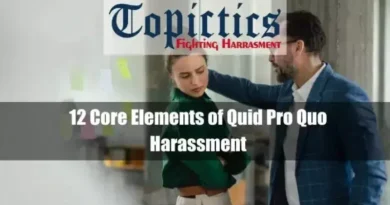Potential Perpetrators of Quid Pro Quo Harassment
Quid pro quo harassment is a serious misconduct that typically arises in environments where power dynamics are at play. The phrase, which means “this for that,” refers to situations where a person in a position of authority demands sexual favors in exchange for professional benefits or threats of adverse action.
Understanding who can be perpetrators of quid pro quo harassment is crucial for preventing such incidents and holding the correct individuals accountable.
Takeaways
| Key Points |
|---|
| Supervisors, managers, and company executives are often the primary perpetrators of quid pro quo harassment due to their control over employment decisions, including promotions, salaries, and job security, which they may exploit to solicit sexual favors. |
| The inherent power imbalance in workplace dynamics makes it difficult for subordinates to refuse inappropriate demands, leading to a hostile environment where compliance is coerced through the fear of retaliation. |
| Extended perpetrators, such as HR personnel and colleagues with delegated authority, can also misuse their influence over employment matters, leveraging their positions to pressure employees into compromising situations. |
| In educational and sports settings, professors, teachers, coaches, and sports administrators hold significant power over students and athletes, using their authority over grades, scholarships, playing time, or career advancement to engage in quid pro quo harassment. |
| Beyond the workplace, contractors, consultants, clients, and customers can also be perpetrators, exploiting their temporary authority or financial influence to pressure individuals into compliance, making quid pro quo harassment a widespread issue that extends across various industries and professional environments. |
Primary Perpetrators
Supervisors and Managers

Supervisors and managers are often at the center of quid pro quo harassment cases due to their direct control over subordinates. Their roles typically involve overseeing the work of others making decisions about promotions, salary increases, and even terminations.
This inherent power dynamic creates an environment where they can exploit their authority to solicit sexual favors.
Roles and Responsibilities:
The primary responsibility of supervisors and managers is to ensure the efficient operation of their teams and to foster a safe and productive work environment. However, when these individuals misuse their power for personal gain, it results in a breach of trust and a hostile work environment. This misuse can manifest as explicit demands for sexual favors in exchange for job security, promotions, or other employment benefits.
How Power Dynamics Facilitate Harassment:
The power dynamics between supervisors and their subordinates are often lopsided, with the former holding significant influence over the latter’s career progression. This imbalance can make it difficult for subordinates to refuse inappropriate demands, fearing retaliation or loss of opportunities. This dynamic is a key factor in many quid pro quo harassment cases, where the victim feels compelled to comply with the harasser’s demands to avoid negative consequences.
Company Executives and Higher Management

Higher management and company executives hold even more influence over organizational decisions, extending their power across multiple company levels. Their ability to shape company policy and make high-stakes decisions places them in a unique position of authority, which, if misused, can lead to severe cases of quid pro quo harassment.
Influence Over Employment Decisions:
Executives and senior management often have the final say on significant employment decisions, including hiring, promotions, and terminations. This level of authority makes it easier for them to pressure employees into compromising situations.
The threat of job loss, career stagnation, or being overlooked for promotions can be potent tools of coercion in the hands of evil executives.
Extended Perpetrators
HR Personnel

Human Resources (HR) personnel are typically seen as an organization’s protectors of employee rights. However, when HR professionals misuse their access to sensitive information and their role in handling employment issues, they can also become perpetrators of quid pro quo harassment.
Misuse of Position and Influence:
HR professionals are entrusted with handling confidential employee information, mediating disputes, and ensuring compliance with workplace policies. This unique position gives them significant influence over employees’ careers, including decisions about promotions, disciplinary actions, and termination.
When HR personnel abuse this influence to solicit sexual favors, it constitutes quid pro quo harassment.
Colleagues with Delegated Authority
In some cases, employees who are not officially part of management but have been given delegated authority may also engage in quid pro quo harassment. These individuals might oversee specific projects or influence certain team dynamics, which can create opportunities for exploitation.
Temporary or Situational Power Dynamics:
Temporary or situational authority can arise in project-based work environments or during specific assignments where a colleague controls a team or task. In such scenarios, the person with delegated authority may use their temporary power to pressure others into sexual favors, especially if the project’s success or the individual’s performance review depends on their approval.
Risks in Peer Relationships:
Peer relationships can also become problematic when one colleague holds sway over another due to seniority or specific job roles. These dynamics can lead to situations where quid pro quo harassment occurs, as the less powerful individual may feel coerced into complying with inappropriate demands to maintain professional harmony or career advancement.
Perpetrators in Educational Settings
Professors and Teachers

Professors and teachers hold significant authority over their students in educational settings, including control over grades, recommendations, and academic opportunities. This power dynamic can lead to situations where quid pro quo harassment occurs, with the educator using their position to solicit sexual favors.
Authority Over Grades and Academic Opportunities:
Professors and teachers can influence a student’s academic trajectory, including their grades, access to scholarships, and opportunities for further study or employment. This authority can be exploited, with the educator offering better grades or academic recommendations in exchange for sexual favors.
The vulnerability of students, who may depend heavily on these academic outcomes, makes this a particularly insidious form of harassment.
Perpetrators in Sports
Coaches and Team Managers

In sports, coaches and team managers influence athletes significantly, controlling crucial aspects of their careers such as playing time, team selection, and endorsements. This authority, when misused, can lead to quid pro quo harassment. Coaches often decide who plays and for how long, which can greatly impact an athlete’s career, particularly at the collegiate or professional level.
Their connections with scouts and sponsors also mean their favor can result in lucrative endorsements. Unfortunately, this power can be exploited, with some coaches demanding sexual favors in exchange for more playing time, favorable team assignments, or endorsements.
This not only undermines the athlete’s autonomy but also fosters a toxic environment where exploitation becomes normalized.
Sports Administrators
Sports administrators, including athletic directors and league officials, hold considerable power within athletic organizations, influencing the careers of both coaches and athletes. They often have the final say in key decisions, such as promotions, funding allocations, and media exposure, which can significantly impact an athlete’s or coach’s career trajectory.
This authority can be abused, leading to quid pro quo harassment, where administrators offer or withhold career opportunities based on compliance with their demands. Such misuse of power exploits individuals and perpetuates a culture of inequality and fear within the sports community.
Perpetrators Outside the Immediate Workplace
Contractors and Consultants

Contractors and consultants, although not direct employees, can wield significant influence in project-based environments, particularly through their control over project outcomes and decisions regarding continued employment.
Their authority to assign tasks, evaluate performance, and recommend future work or promotions can be exploited for quid pro quo harassment. Some may demand sexual favors in exchange for favorable assignments or recommendations, and the temporary nature of these roles can make victims reluctant to report the harassment, fearing that their contracts might not be renewed if they do so.
Clients and Customers
Clients and customers, especially those with significant purchasing power or influence over a company’s success, can also perpetrate quid pro quo harassment, a dynamic often overlooked but crucial in client-driven industries. In such industries, where client satisfaction is paramount, the balance of power can shift toward the client, leading to situations where inappropriate demands are made.
These clients may exploit their influence, knowing it could impact the employee’s standing or the company’s financial health. Employees in roles such as sales, customer service, or client relations may feel pressured to comply with these demands to secure business or avoid negative repercussions, making this a significant concern in maintaining ethical business practices.
Intersectionality and Power Dynamics

Gender and Power Imbalances
Gender significantly influences quid pro quo harassment dynamics, particularly because women are often underrepresented in leadership roles, making them more vulnerable to such misconduct. This vulnerability is heightened when gender intersects with factors like race, age, and economic status.
Traditional gender roles, which frequently position women in subordinate roles in both workplaces and academic settings, further exacerbate this issue. Male supervisors may exploit these societal expectations, coercing female employees into compliance under the guise of authority.
This pattern of exploitation underscores the necessity for gender-sensitive policies and interventions to combat harassment effectively.
Other Intersectional Factors (Race, Age, etc.)
Race, age, and other demographic factors intersect with gender, creating complex power dynamics that can heighten vulnerability to quid pro quo harassment. Women of color, for example, often face a dual burden of discrimination based on both race and gender, increasing their susceptibility to harassment.
Intersectionality theory highlights how various forms of discrimination, such as ageism, racism, and sexism, can overlap, leading to unique and compounded experiences of harassment. For instance, an older woman of color might be targeted by harassment that exploits her multiple vulnerabilities.
Addressing these intersecting factors is essential for developing effective strategies to prevent and combat quid pro quo harassment.
Legal Definitions and Framework

Overview of Relevant Laws (Title VII, Title IX, FEHA, etc.)
Quid pro quo harassment is addressed under several legal frameworks, most notably Title VII of the Civil Rights Act of 1964 and Title IX of the Education Amendments of 1972. Title VII prohibits employment discrimination based on race, color, religion, sex, and national origin, which includes sexual harassment. Under this law, employers are held accountable for the actions of their supervisors and other employees who engage in such harassment.
Title IX, on the other hand, applies to educational institutions receiving federal funding, prohibiting sex-based discrimination, including sexual harassment, within those institutions.
The Fair Employment and Housing Act (FEHA) in California is another critical piece of legislation that expands protections against sexual harassment in the workplace. FEHA covers not only employees but also job applicants, making it illegal for those in positions of authority to condition employment opportunities on the acceptance of sexual advances.
Definition of Authority in the Context of Harassment
In quid pro quo harassment cases, the concept of authority is central. Authority refers to an individual’s power over another in a professional or academic setting, enabling them to influence significant aspects of the victim’s career or education. This can include decisions regarding hiring, promotions, academic grades, and other benefits or detriments.
Legal interpretations of authority often focus on whether the harasser could grant or withhold a tangible job or academic benefit. Those in supervisory roles, whether in the workplace or educational institutions, are most commonly involved as perpetrators due to their inherent authority.
Legal Precedents and Case Studies
Legal precedents have established that organizations are typically liable for quid pro quo harassment if it is perpetrated by someone in a supervisory position. For example, in Burlington Industries, Inc. v. Ellerth (1998), the U.S. Supreme Court ruled that an employer could be held liable for the actions of a supervisor who engaged in quid pro quo harassment, even if the employee did not suffer any tangible job loss.
Another significant case, Gebser v. Lago Vista Independent School District (1998), extended this principle to educational settings under Title IX. The court ruled that a school district could be liable for the actions of a teacher who engaged in quid pro quo harassment if the school knew the harassment and responded with deliberate indifference.
Accountability and Legal Recourse

Holding Perpetrators Accountable
Effective accountability mechanisms are crucial for deterring quid pro quo harassment, requiring both the enforcement of existing laws and the establishment of robust internal policies to address incidents promptly and fairly.
Organizations must conduct thorough, independent, and impartial internal investigations when harassment is reported, with clear procedures for evidence gathering and witness interviews. If an investigation confirms the harassment claims, appropriate disciplinary actions, including termination, should be taken against the perpetrator.
In cases where harassment is severe or internal mechanisms fail, legal action may be necessary. Victims can file complaints with agencies like the Equal Employment Opportunity Commission (EEOC) or pursue civil litigation under Title VII or Title IX laws.
Role of Employers and Educational Institutions
Employers and educational institutions have both legal and moral responsibilities to prevent quid pro quo harassment, which includes fostering a safe environment where everyone feels respected and valued. Preventative measures are key and should include implementing clear anti-harassment policies, offering regular training sessions to all employees and students, and establishing confidential reporting mechanisms.
These policies must be clearly communicated to all members, and specific procedures for handling harassment complaints must be detailed.
Additionally, institutions should regularly review and update their policies to align with law and best practice changes. Regular training, especially those that focus on recognizing and preventing harassment, is vital for maintaining a harassment-free environment.
Conclusion
Understanding who can be perpetrators of quid pro quo harassment is essential for preventing misconduct and protecting vulnerable individuals. Perpetrators are often those in positions of authority, whether in the workplace, educational settings, or other professional environments.
By recognizing the power dynamics at play and implementing robust preventative measures, organizations can create safer environments for everyone involved.









